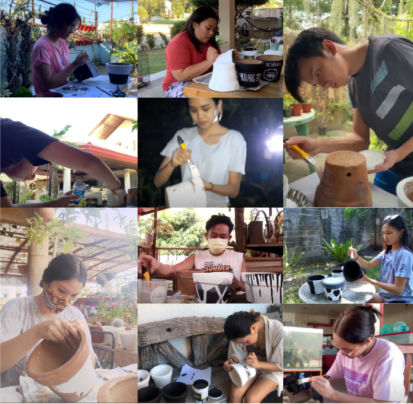- ARNEL CHRISTOPHER E. CALATRAVA
If there was a way to promote a social cause in the midst of the pandemic, what would it be?
This was the question I and my classmates asked when we deliberated on our end-term project for our Social Entrepreneurship class. Just like the rest of the country, we had been stuck in the online class setup: perpetually boring, immensely draining mentally and there was little room to conduct meaningful activities.

But the Social Entrep class did create a meaningful endeavor, and for a good cause, too: Project Potsitivity, a social enterprise dedicated to advocating mental health while using the profit for a social cause. But by no means was the organization and implementation of this one-time, social enterprise end-term project.
I had previously organized activities prior to COVID, but due to that, there are obstacles that had to be addressed, most notably on discouraging mass gatherings. For many weeks, this was the question that ran through my mind, along with those of the committee heads: Program head Darwin Kho, Finance head Hannah Gallo, Tech head Christian Lizares, Logistics head Charry Tayongtong, and Documentations head Andrea Sotto.
After the initial organization of heads on March 22, our plan was to initially hold a workshop for out-of-school youth, affected by the pandemic, to create a product that can be sustainably sold, and to which the profits would be given. We project leaders also decided to carry out the decision to use hand-painted pots as our product.
Many suggestions came up on what our product should be: from manually-printed shirts, to knitting, and even tote bags, but we decided to settle on hand-painted pots, specifically because it was anticipated that the would-be beneficiaries might possess basic skills, so painting was perceived to be one of the easiest “gateway” skills that our class could teach them.
However, as our portfolio was almost finished, we received word that our proposal to hold a workshop was not approved, simply because face-to-face academic activities were prohibited; this made sense, since if it were allowed, there would have been no online classes in the first place. But it also somewhat didn’t make sense because, at that point, community pantries, such as the one at USLS, had already been set up and operating on a face-to-face basis.

We were in no position to argue about that, but thanks to quick thinking and the spirit of positive compromise, we came up with a much more compliant plan.
Instead of a workshop, the painted pots would be made by each of the 37 students in our class, and, at the close of a mental health webinar we would also organize, the pots would be then sold by each as a demonstration of their entrepreneurial skills.
At the same time, we organized the mental health webinar on May 6, 2021, titled “Stay Potsitive”, where we invited resource speakers Caroline “Kitkat” Carmona, a mental health advocate, and Liberty Ochavo of the USLS Guidance and Evaluation Center (GEC). Together with several participants from other schools and different courses, the webinar was a resounding success.
At that point, the pots were sold for an extended two-week period to various customers for only P120 per pot. Later, 70 percent of all profit was collected, as this was earmarked for donation to two community pantries: the Kinaiya (USLS) Community Pantry, through Jasmen Ruiz, and the Akbay PH Community Pantry via Jessica Leal and fellow Social Entrep classmate Samantha Go. The total donation we gave to both pantries was approximately P10,000, including a P1,000 miscellaneous added donation from one of our classmates.
One might expect that, after selling everything and compiling the contents of the portfolio to be submitted, we can forget about this project. However, one of our committee heads received a message requesting whether we were amenable to a live radio interview with Bombo Radyo Bacolod that Sunday. It was elating, and some of us appeared on air as we were interviewed via Zoom, and broadcast across the waves.
As of writing, we have concluded our portfolio and have already been graded for our performance, which for me was one of the most memorable in recent memory.
Indeed, given the right goals, mind-set, and people, we were able to make a small project worth our while, with huge potential for continuance beyond the class. All it took was a “potsitive” mind-set, and a big trust in the process. – NWI



